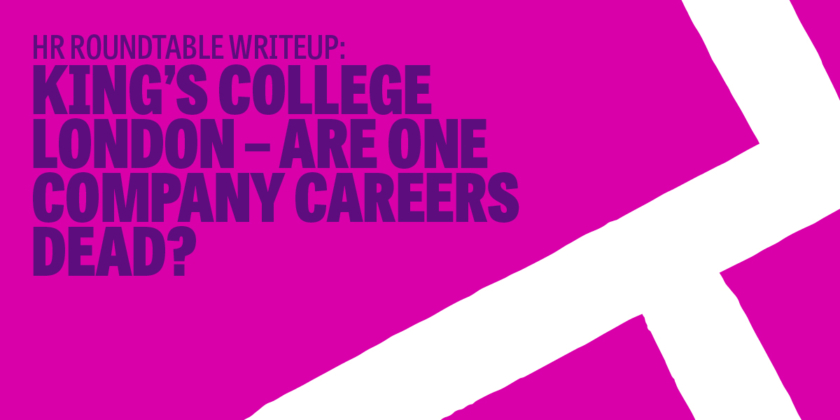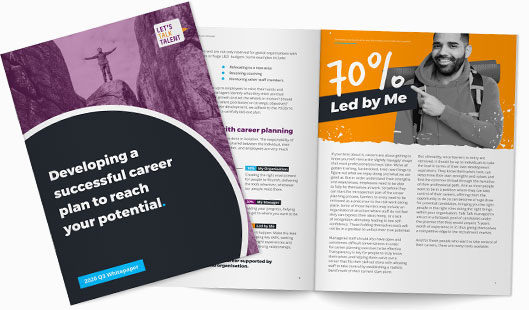What do we all have in common when it comes to career planning?
How a gathering of top HR Directors provided valuable insight into how to better support employees with their career progression plans
We recently had the pleasure of co-hosting a roundtable on the topic of career development, in collaboration with the remarkable Lorraine Kelly. No, not the Scottish TV presenter, as she says herself, but Kings College London’s Director of Organisational Development. And whilst the topic of career development seems like an easy one to tackle in an hour with a virtual zoom room full of HR Directors (we should already be actively supporting employees who wish to progress with their careers, right?), it turns out we all had a lot to say.
What used to be a once yearly exercise led by managers in an effort to retain staff with the prospect of one day filling up the seat above has now evolved. Hugely. And in the last few months alone, the rate of change has accelerated in a way nobody could have foreseen.
Businesses are now moving so quickly that the very first question on the session’s agenda was a rather difficult one: How do you help staff create career plans when it is possible that the organisation they work in will be completely different within six months? Well whilst we didn’t end up with one standard magic answer (spoiler alert), our discussion did offer some extremely useful insight into the greatest barriers to career planning, and more importantly, how to overcome them.
Led by the employee
At Let’s Talk Talent, we are firm believers in the 70/20/10 model. When it comes to career planning, 70% should be led by the employee, 20% supported by the manager and 10% backed by the organisation. But this very much puts the onus on individuals to take their career into their own hands, which most of us around the table recognised as a bit tricky sometimes.
Progression is no longer linear and career pathways are unique, so it can be difficult for people to plan what they should be doing next or even where they want to end up. So how can managers and HR professionals support career development for a talent pool that may not be clear on where they want to get to?
In order to answer this, Lorraine shared the work she has done with us at Let’s Talk Talent on the Career Pathways project, a great example of how to help people understand themselves, their strengths, weaknesses and potential professional next steps.
The final output of the project, a guidebook aimed at managers and designed with the sole purpose of creating dialogue and generating great career discussions, includes practical exercises such as the STAR map and the Career Navigator.
We all agree that the many demands on management’s time sometimes leaves little leftover for guidance and support on career progression. Having a starting point and clear to-dos when it comes to helping team members define both their career goals and the way to reach them can only be beneficial.
Supported by managers?
And whilst on the topic of leadership teams playing a key role in the process of employees’ career planning, it seems many of our roundtable participants had encountered various challenges in that area at some point in their careers. Managers are a necessary bridge between people’s progression needs and the opportunities available within the organisation.
But it became quickly apparent during our chat that not all managers are equipped to have the right career conversations and thoroughly support staff through their professional journeys, sometimes leaving employees to their own devices. And that’s something we’ve noticed too as part of our Coach on Demand service. In fact, over 90% of all coaching sessions we hosted in 2019 were focussed on one question only: ‘How can I progress with my career?’
Those discussions can sometimes be very challenging as giving transparent and honest feedback is no easy task. With companies often taking a traditional view of progression and promoting technical experts to leadership roles based on knowledge or seniority alone, as opposed to focussing on management potential, there can be some skills gaps to fill. As Jo said: ‘It is more important to give managers skills to develop careers rather than static career paths.’ And the rest of us couldn’t agree more.
Backed by the organisation
But it’s not all doom and gloom as the participants shared many examples of leading organisations offering a vast array of innovative programmes designed and put in place with the sole purpose of supporting staff career progression and broadening employee experience. These ranged from coaching and mentoring programmes to internal mobility and secondment opportunities.
Most businesses, including Kings College London, are now recognising the importance of offering their talent pool varied development opportunities in order to both retain qualified staff and build a strong pipeline for the future.
Conclusion
As it turns out, an hour was not enough, but the insight gathered was quite enlightening already. We certainly found out that the challenges linked to career planning are not unique to each organisation.
Most businesses know the theory: individuals taking charge of their own career plans based on a good level of self-awareness, managers removing barriers to entry and connecting employees with opportunities for growth, organisations backing the process by ensuring those opportunities are made available. But in reality, this three-pronged approach is rarely perfect and needs a little nudging on one side or the other. And that’s where great HR professionals like the ones we had the pleasure of hosting can make a huge difference.
Once again we’d like to thank everyone who participated in our roundtable discussion and we simply can’t wait to hear more about the Career Pathways project roll out at Kings College London. So we’ll make sure we get Lorraine back in the virtual room to discuss the next phase once it has been delivered. Now that’s an incentive to watch this space.
In the meantime, if you’d like to learn more about how to support employees with career planning, we have just released a whitepaper full of tips and practical exercises to get you started. Click here to download the career planning whitepaper now. And we also have a series of webinars and What’s App courses on the topic. Because we really are passionate about connecting people with purpose.

